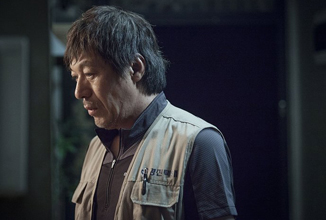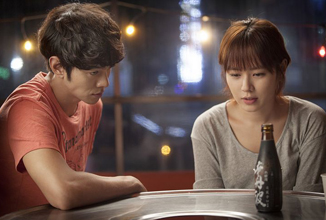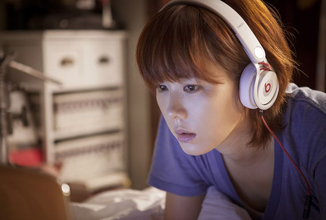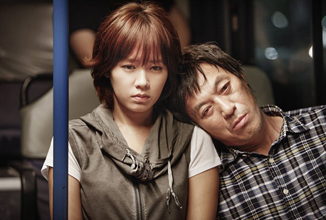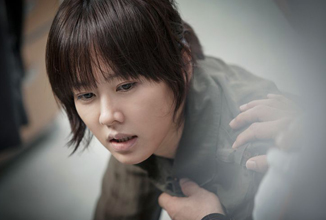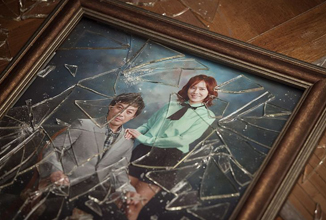
 |
||||||||
Da-eun (Son Ye-jin) is a 26-year-old woman who has a deeply close and loving relationship with her mild-mannered, doting father Soon-man (Kim Kap-soo). Happy to openly admit that she trusts her father implicitly and loves him unconditionally, Da-eun is unsettled, to say the least, on watching a film with friends about the abduction and murder of a young boy almost 15 years ago; a case on which the Statute of Limitations is soon to expire. For, within the film is a recording of the murderer demanding money for the safe return of the child and try as she might Da-eun cannot ignore the similarities to her own dear father's voice.
Review: Over the years, tales of abduction, murder and serial killings have been abundant in Korean cinema; an increasing number detailing police efforts to bring a killer to justice before the 15-year Statute of Limitations expires. Some - such as 2009's 'White Night' (also starring the inimitable Son Ye-jin) - have succeeded in being utterly gripping, multilayered tours de force of cinema while others - 'Confession of Murder' (2012), for example - have been somewhat less well realised, but regardless of which of these descriptions fits a particular film each has largely strived to focus on a different aspect of a well trodden narrative path in an attempt to allow it to stand out from the crowd.
'Blood and Ties' opens with a short 'home movie' segment showing Da-eun as a child playing with her as always doting father, subsequently cutting to her (present-day) lying unconscious in a bed; her face full-screen clearly both cut and bruised. As she slowly regains consciousness, Da-eun's mind flashes back to scenes from her youth - her dad frantically searching for her in the rain; telling her to never take anything from strangers; testing her writing skills by dictating directions to a trash can near a bakery; and having her repeat his favourite phrase 'It ain't over till it's over - and on finally opening her eyes the narrative steps back in time to begin its story in earnest, detailing the events leading to her being in the (as we later discover, hospital) bed.
Not only that, but as the narrative proceeds and the tension mounts sadly so do the plot holes and while some are passing and could (almost) be let fly others are so blatant as to pull certainly this reviewer, at least, out of story immersion; undermining both story and character believability, in the process. Just one example of these many plot issues and narrative 'head-scratchers', if you will, can be found at around the halfway point of the film in a conversation between Da-eun and the father of the murdered child: Assuming Da-eun is a reporter, he hands her a note written by a child connected to the killer (and sent by the criminal) containing directions to where the ransom money would have to be left to ensure the young abducted boy's safe return, telling Da-eun to make sure it's published in the media... With such an obviously pivotal piece of evidence, why is it still in the father's possession? Wouldn't he have given it to the police who are utterly desperate for any clues to the killer's identity? Even if he had given this vital note to police at the time of the crime, would they really have given it back? And if they had returned it to him for some inexplicable reason, with so much media and public interest in the case currently as well as the Statute of Limitations clock ticking away, wouldn't it be rather advisable for them to have it now? And wouldn't the father realise that? For those of you who think I'm being overly picky (and feel free to do so, if you wish) all I'll say is that the plot inconsistencies and annoyances are such, and frankly so frequent, that as far as I'm concerned anyone would tend towards being less forgiving than might otherwise be the case. Ok, so in this example Da-eun seeing the note is pivotal to her questioning whether she actually wrote it as a child - if she did, making her an accomplice to the crime - but surely that could have been achieved another more believable way... surely.
The question of whether Soon-man is ultimately innocent or guilty is essentially answered long before the film's conclusion but Gook Dong-seok nonetheless keeps throwing in 'is he or isn't he' moments right up to the very second the Statute of Limitations expires and again though his reason for doing so is understandable - Da-eun battling between her moral conscience and her loyalty to perceived familial bonds - the opportunity for any insightful dissection is largely wasted. Instead, we have Da-eun boomeranging from "You're my father; even if you're guilty I can't report you" to "You did it, didn't you? I'm going to the police" and back again, more than once. To my mind this is an utter, utter shame when just a little more care, thought and attention could have produced a far more original take on a familiar formula. Cast (character... actor): Summary: While 'Blood and Ties' tries to be an original take on a familiar narrative subject in its attempted dissection of familial ties, any chance of insightful commentary is marred by plot holes and predictably throughout. Ultimately, the appearance and performances of Son Ye-jin and Kim Kap-soo are by far the strongest aspects of the film.
|
||||||||
All images © CJ Entertainment, Sunshine Films Review © Paul Quinn |
||||||||

